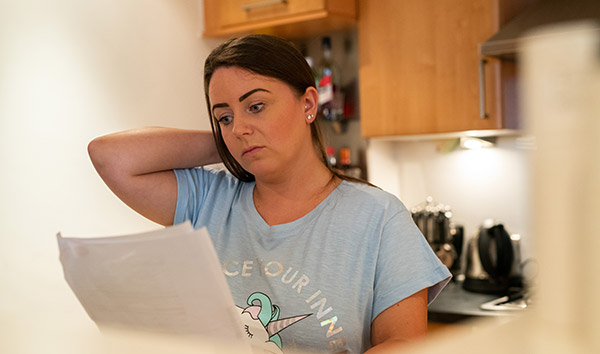8 ways to complain and get what you want
All companies should strive to give good service but sometimes service falls...
It’s safe to assume, most of us have experienced a breakup. Granted though, some are worse than others.
Think back to your first heartbreak and feeling as though you’d never be happy again while listening to Adele’s album on repeat…anyone? Just me then!
As we get older, things unfortunately tend to get more complicated as we don’t just share mix tapes (showing my age slightly) but houses, holidays, bills, bank accounts and everything in between.
But, what happens to joint finances or joint debts if your relationship comes to an end? How do you deal with a joint debt after divorce? If your ex-partner spent more of the joint credit than you, is there anything you can do ot contest it?
We previously wrote about splitting up with joint debts back in 2011 – have a read.
First, let’s take a look at the different types of joint debts.
Joint debts can include:
When it comes to credit card debt, there’s no such thing as a joint credit card. You can have additional card holders, but they won’t appear on the agreement and ultimately aren’t responsible for paying back any of the balance – so this can’t be a joint debt after divorce.
A similar type of debt would be a guarantor loan. This is where another person agrees to pay the loan in full if you’re unable to, which is a risky move to take. Guarantor loans are usually targeted at people with a poor credit rating and they cost a lot more to repay due to higher interest rates and other charges.
We’d always advise not to guarantor a loan for anyone unless you are 100% certain you can afford to repay the loan yourself.

The key difference on a joint debt is that two names will appear on the credit agreement. You’re both equally liable for the full amount, not just your share or half, and regardless of who spent what originally. Legally, this is called being ‘joint and severally liable’.
A few things to keep in mind about joint and several liabilities:
• It applies to bills like your council tax or water
• It applies to overdrafts, also repayable ‘on demand’
When you take out a joint debt you link yourself to that person financially. This is done through your credit file. If one of you can’t (or won’t) pay, then both of your credit files can be affected. Equally, the other person’s bad credit score can affect yours which is why money and debt can add so much stress to a relationship.
However, there is a silver lining: if the debt is well managed then you’re both rewarded.
Let’s look at what would happen to a £1,000 joint loan if your partner left, went into a debt solution, and was no longer paying towards the debt.
If your ex-partner goes bankrupt, your joint debt wouldn’t be included in their bankruptcy. You would become responsible for repaying the remaining balance of the loan.
If your ex-partner takes out an IVA, they’ll make some payments towards the debt. However, it might be that for every £1 in the loan they only pay 20p. That would mean you’d have to cover the other 80%.
If your ex-partner sets up a DMP they can add a joint debt such as a loan to their plan. The creditor will then receive a fair share of the monthly DMP payment. This is likely to be lower than the original payment amount and the creditor will look to you to make up the difference every month so the total payment is covered.
In some situations it’s worth trying to make an arrangement with the other person on how you’ll repay a joint debt. Because the debt will affect you both if you don’t keep up the payments, there’s definitely incentive for you to meet one another half way.
Sometimes things aren’t as straightforward, for example if you’ve separated on bad terms. In this kind of situation, it’s best to talk to your creditor and seek expert debt advice on what your options are.

Afraid not. They’re likely to contact your ex andask for payments, but they’ll expect the monthly payment to be made in full from at least one of you.
If one of you can’t or won’t repay a joint debt, you’re both liable for the full debt no matter which one of you spent the money. This is known as ‘joint and several liability’.
If your ex-partner took out debt in your name without telling you, either by applying ‘as you’ or adding your name to a joint debt, this could be considered fraud, which is pretty serious. In this situation we’d recommend reporting it to the police.
If the police consider it to be a criminal fraud offence, prosecutors may decide there’s enough proof to start criminal proceedings. This isn’t guaranteed however.
Another option is to pursue the matter as a private action through the civil courts. If you decide to do this, please speak to a solicitor first.
Reporting credit fraud against an ex-partner can be difficult to do for several reasons. For example, if this was an abusive relationship, you may worry that reporting your ex-partner to the police could result in repercussions against you.
Speak to your creditor in confidence, as they may have processes in place to help people deal with debt from relationships that end badly or that have a history of abuse.
There have been some cases in the media of people taking their ex-partners to court and successfully suing them for money owed.
If you have evidence such as emails, text messages or letters from your ex-partner that admit they owe you money, you could take the matter to small claims court.
If you and your ex-partner made an agreement on how much money was paid to the debt each month, and your ex-partner has kept up with these payments, the Court might not consider your case. However, if your ex-partner has missed payments or refuses to pay, and you can prove that an agreement was made, then the court might hear you out.
Again, guidance from a solicitor is highly recommended before you go ahead with this. Depending on how much is owed to you, it may be more expensive to take an ex-partner to court than look at other ways they could pay the money back.
Visit the Citizens Advice website for information on how to get free or affordable legal advice.
While we can’t promise your relationship will last forever, we do know that if it doesn’t, your heart will mend in time and we hope you have friends and family (and ice cream) to support you through it.
We know it’s pessimistic but it’s a good idea to consider if you can afford the repayments for joint debts on your own in case the worse should happen. If you’re not sure, check out our guide on how to set up a budget.
And, if you’re not totally comfortable with the idea of being tied to someone financially, it’s OK to say no.
Are you concerned about debts you have with a partner or ex-partner? How did you approach setting things up such as joint bank accounts or loans?
Let us know in the comments.